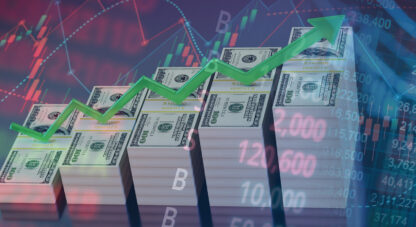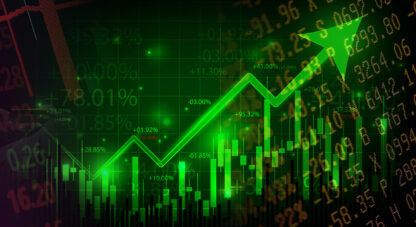Italian bank stocks (FTSE Italia bank index) declined a modest 2.3% Monday on the back of Sunday’s resounding defeat of Italian Prime Minister Renzi’s political reform referendum. The bank index then proceeded to surge 9.0% Tuesday, 4.5% Wednesday and another 3.6% Thursday, for a stunning 27% rally off November 28th trading lows. “Par for the course,” as they say. Italian 10-year sovereign yields rose eight bps Monday, yet by Wednesday’s close yields were actually lower on the week. Italian sovereign CDS ended the week little changed. Italian stocks gained 7%.
Following Brexit, Trump’s win and Renzi’s defeat, hedging market risk has been relegated to the status “senseless lost cause”. A short squeeze and unwind of hedges fueled this week’s 12.7% Italian bank rally, along with a 9.5% surge in European banks that reverberated in Asia (Japan banks up 5.6%), the U.S. (banks up 5.4%) and globally. Especially in Europe, a reversal of bearish hedges created powerful buying power. It’s a common trading strategy to purchase put options with proceeds from selling out-of-money call options. Increasingly in the U.S. and in Europe, equities trade as if those on the wrong side of derivative (calls) trades are being forced to hedge exposure by aggressively purchasing stocks into a rapidly rising market. It’s a self-reinforcing market dislocation similar to that which not many months back fueled a historic collapse in global bond yields.
One is left to assume that there must be some silver lining to Renzi’s defeat and resignation. From a fundamental perspective, it’s not obvious where to look. Italy’s anti-establishment Five Star Movement and Northern League political parties are salivating at the thought of new elections possibly early in the year (some speculating February). The Continent’s anti-euro and anti-establishment parties are emboldened. Meanwhile, the slow-motion Italian banking train wreck is chugging along.
December 9 – Reuters (Silvia Aloisi and Paola Arosio): “The European Central Bank has rejected a request by Italy’s Monte dei Paschi di Siena for more time to raise capital, a source said…, a decision that piles pressure on the Rome government to bail out the lender. Italy’s third-largest bank, and the world’s oldest, had asked for a three-week extension until January 20 to try to wrap up a privately funded, 5-billion-euro ($5.3 billion) rescue plan… The ECB’s supervisory board turned down the request at a meeting on Friday on the grounds that a delay would be of little use and that it was time for Rome to step in… The Italian government is expected to intervene in the next few days to recapitalize the bank to avert the risk of it being wound down, according to banking sources…”
Monte dei Paschi, Italy’s third-largest bank, saw its shares halted Friday down 10%. With a private-sector recapitalization now in doubt, a government rescue would test the EU’s new rules for forcing “bail in” losses upon bondholders. Italian banks have sold large quantities of bonds to unsuspecting retail customers, creating the potential for significant political fallout in a period of already heightened public anger. There are also the serious issues of further capital flight out of Italy and even bank runs.
One doesn’t have to search far to explain the markets’ sanguine view of Italy – and the world more generally. Thursday the ECB extended its QE program – previously scheduled to conclude in March – through the end of 2017. Curiously, in his Thursday press conference Mario Draghi noted that financial markets have “proved much more resilient” than expected, crediting well-capitalized financial institutions and robust supervisory and regulatory regimes. Surely Draghi appreciates that QE is fully responsible for global markets increasingly content to dismiss risk.
It’s astounding how far the Draghi ECB has drifted away from core founding principles. Former ECB president Jean-Claude Trichet would regularly repeat “The ECB never pre-commits on rate policy.” This was a critical distinction from the Federal Reserve that under Greenspan became too fond of using prospective rate moves to manipulate market behavior. Federal Reserve policymaking incentivized speculation and was instrumental in nurturing an increasingly unwieldy global pool of speculative finance. Global policies since the 2008 crisis have spurred the expansion of speculative finance to multiples of pre-crisis levels. It’s also rather clear that European debt markets have evolved into a bastion of leveraged speculation. Draghi was in no mood to contemplate the party ever ending.
Thursday’s ECB announcement created some confusion in the markets. While QE was extended through the end of the year, the size was reduced to 60 billion euros ($64bn) monthly from 80 billion. Draghi sternly shot down attempts to label the move as “tapering,” adding that it “has not even been discussed. In fact, it’s not even on the table.”
Bundesbank president Jens Weidmann apparently voted against extending the QE program. Surely he and other German policymakers were even more disappointed in Draghi’s post-meeting comments.
I believe history will view it was a serious mistake that the ECB did not use Thursday’s meeting as an opportunity to commence the process of weening the markets away from QE. Better to use the current “Risk On” backdrop to impose some reality as opposed to nourishing the beast. Worse yet, Draghi signaled that the ECB would continue backstopping the markets indefinitely. He spoke of “open ended” QE and stated that the ECB would be operating in the markets for “a long time.” Draghi stated that “uncertainty prevails everywhere,” implying that markets can strut with absolute certainty in “whatever it takes.” With Draghi’s assurances that QE could be boosted if necessary, the markets are more confident in an expanding program than one that will wind down at the end of 2017.
December 9 – Reuters (Paul Carrel): “Mass-selling German newspaper Bild heaped criticism on European Central Bank President Mario Draghi on Friday, a day after the ECB said it would extend its massive stimulus programme for the euro zone. ‘When does Draghi’s money bomb go off?’ Bild asked, with a picture of the Italian’s face on a bomb with a lit fuse. The ECB has already spent more than 1.4 trillion euros buying bonds and is at risk of running out of assets. Germany’s Bundesbank argues that this blurs a legal line and amounts to financing of government budgets… German Finance Minister Wolfgang Schaeuble… has called on the ECB to start unwinding its expansive monetary policy. ‘The ECB chief is again putting billions at the disposal of crisis countries,’ added Bild…”
The German DAX jumped 6.6% this week, with France’s CAC 40 up 5.2%. Stocks were up 6.6% in Spain, 5.1% in Portugal, 4.3% in Ireland, 4.1% in Switzerland and 4.3% in Greece. Meanwhile, bond yields moved higher. Yields rose 14 bps in Italy and 20 bps in Portugal. And with French yields up 9 bps to near 11-month highs, political risk has begun to make its way into France’s debt instruments.
December 9 – Bloomberg (Piotr Skolimowski and Mark Deen): “The European Central Bank’s latest extension of quantitative easing contains ‘a form of warning’ that unprecedented monetary stimulus is not going to last forever, Executive Board member Benoit Coeure said on Friday. ‘Sources of growth that aren’t dependent on monetary policy need to be found. Long-term rates will rise… Economic players need to be ready, notably governments that have benefited a lot from falling rates.’”
While expected to be down somewhat from 2016’s nearly $2.0 Trillion, global markets remain confident in the immensity of 2017 QE liquidity injections. The ECB has committed to about $800 billion, while the BOJ is poised to purchase huge quantities of JGBs as global yields rise. With printing as far as the eye can see, where’s all this “money” going to go?
The DJIA gained almost 600 points this week to another record, as the index rather rapidly approaches 20,000. The S&P500 jumped 3.1%, also to an all-time high. In the broader market, last week’s pullback proved short-lived. The small caps surged 5.6% this week, with the midcaps up 4.2% – both to record highs. The Russell 2000 has surged almost 17% since the election, with the Banks (BKX) up 23%. Bank stocks added another 5.4% this week, increasing 2016 gains to 27.2%. The broker/dealers rose 4.5%, increasing Q4 gains to 22.8%.
With stocks on the fly, an additional moderate increase in yields caused little market angst. Ten-year Treasury yields rose eight bps to 2.47%, the high since June 2015.
ETF.com (Sumit Roy): “Investors continued to plow money into ETFs at a breakneck pace during the first week of December. After adding $48 billion to U.S.-listed ETFs in November, they added $14.6 billion to the space in the week ending Thursday, Dec. 8. Year-to-date inflows now total $229.5 billion… That puts 2016’s flows within range of 2014’s record annual flows of $244 billion. Once again, U.S. equity ETFs took in the largest haul of the weekly flows, at $11.4 billion.”
Donald Trump can be excused these days for brimming with over-confidence. The President-elect is emboldened, and record stock prices play right into the audacity of it all. Trump is on a mission, and few these days question his determination to go about things differently. He energizes “Thank You Tour” crowds with rhetoric that would have traditionally receded right along with campaigning. In contrast to Draghi, Trump examines the backdrop and sees an opportunity for boldness. I would imagine Chinese officials monitored his comments this week with rising trepidation – and annoyance. Is Trump laying the groundwork to confront the Chinese?
December 8 – Reuters (Emily Stephenson): “President-elect Donald Trump said on Thursday the United States needed to improve its relationship with China, which he criticized for its economic policies and failure to rein in North Korea… ‘China is not a market economy,’ he said. ‘They haven’t played by the rules, and I know it’s time that they’re going to start… You have the massive theft of intellectual property, putting unfair taxes on our companies, not helping with the menace of North Korea like they should, and the at-will and massive devaluation of their currency and product dumping,’ Trump said of China. ‘Other than that, they’ve been wonderful, right?’”
December 8 – Bloomberg (Jennifer Jacobs, Mark Niquette , and David Tweed): “U.S. President-elect Donald Trump vowed that China would soon have to ‘play by the rules,’ as Chinese state media issued its clearest warning yet about its bottom line on Taiwan. ‘China is responsible for almost half of America’s trade deficit,’ Trump said at a rally Thursday evening Des Moines, Iowa. ‘China is not a market economy … they haven’t played by the rules, and they know it’s time that they’re going to start. They’re going to start. They’re going to.’”
December 7 – Financial Times (Hudson Lockett): “China’s foreign exchange reserves fell nearly $70bn last month as the country’s central bank burnt through more of its war chest in its battle to defend the renminbi from greater depreciation on the back of accelerating capital outflows. Reserves at the People’s Bank of China fell $69.1bn to $3.051tn in November, a decline of 2.2% from the previous month and the largest drop since a 3% fall in January… The fifth consecutive monthly fall points to growing difficulty for policymakers. Since a sharp renminbi depreciation in August 2015, Beijing has sought to combat more severe softening against the dollar by selling the US currency from the central bank’s forex reserves.”
China is today unusually fragile. Its maladjusted Bubble Economy is vulnerable to any slowing of Credit growth. Its rapidly inflating financial sector is an accident in the making. Its bloated export sector is increasingly uncompetitive globally. China’s currency is susceptible to ongoing massive outflows – “hot money,” corporate and the Chinese household sector. And each of these serious issues is being aggravated by U.S. election results and resulting higher yields and king dollar, along with the prospect for a more active Federal Reserve.
In a normal environment, markets would be reacting nervously to Trump’s unorthodox comments, tweets and positioning on China. But melt-up dynamics are the current fixation. It’s easy these days to ramble on about lower corporate taxes and deregulation than to ponder the ramifications of President Trump moving early in his administration to confront the Chinese on trade and currency manipulation. This would be a dicey fight on behalf of U.S manufacturing and the American worker – with the indomitable equities market potential collateral damage.
For the Week:
The S&P500 jumped 3.1% (up 10.5% y-t-d), and the Dow gained 3.1% (up 13.4%). The Utilities rose 2.6% (up 10.6%). The Banks surged 5.4% (up 27.2%), and the Broker/Dealers jumped 4.5% (up 19.8%). The Transports advanced 4.0% (up 25.3%). The broader market was on fire. The S&P 400 Midcaps rose 4.2% (up 21.0%), and the small cap Russell 2000 jumped 5.6% (up 22.2%). The Nasdaq100 gained 3.3% (up 6.6%), and the Morgan Stanley High Tech index rallied 3.9% (up 13.6%). The Semiconductors advanced 5.2% (up 34.5%). The Biotechs were unchanged (down 17.5%). With bullion down $18, the HUI gold index lost 3.8% (up 58.6%).
Three-month Treasury bill rates ended the week at 53 bps. Two-year government yields added three bps to 1.13% (up 8bps y-t-d). Five-year T-note yields gained seven bps to 1.89% (up 14bps). Ten-year Treasury yields rose nine bps to 2.47% (up 22bps). Long bond yields jumped nine bps to 3.15% (up 13bps).
Greek 10-year yields rose 20 bps to 6.63% (down 69bps y-t-d). Ten-year Portuguese yields jumped 15 bps to 3.85% (up 133bps). Italian 10-year yields gained 14 bps to 2.04% (up 45bps). Spain’s 10-year yields declined three bps to 1.51% (down 26bps). German bund yields rose eight bps to 0.37% (down 26bps). French yields gained nine bps to 0.81% (down 18bps). The French to German 10-year bond spread widened one to 44 bps. U.K. 10-year gilt yields increased seven bps to 1.45% (down 51bps). U.K.’s FTSE equities index rallied 3.3% (up 11.4%).
Japan’s Nikkei 225 equities index gained 3.1% (down 0.2% y-t-d). Japanese 10-year “JGB” yields rose two bps to 0.06% (down 20bps y-t-d). The German DAX equities index surged 6.6% (up 4.3%). Spain’s IBEX 35 equities index jumped 6.5% (down 3.9%). Italy’s FTSE MIB index rose 7.1% (down 14.6%). EM equities were mostly higher. Brazil’s Bovespa index added 0.3% (up 39.6%). Mexico’s Bolsa jumped 5.3% (up 9.2%). South Korea’s Kospi gained 2.7% (up 3.2%). India’s Sensex equities index advanced 2.0% (up 2.4%). China’s Shanghai Exchange slipped 0.3% (down 8.7%). Turkey’s Borsa Istanbul National 100 index rallied 3.2% (up 5.6%). Russia’s MICEX equities index jumped 3.7% (up 25.4%).
Junk bond mutual funds saw inflows surge to $2.034 billion (from Lipper).
Freddie Mac 30-year fixed mortgage rates jumped 13 bps to a two-year high 4.13% (up 18bps y-o-y). Fifteen-year rates added two bps to 3.36% (up 17bps). Bankrate’s survey of jumbo mortgage borrowing costs had 30-yr fixed rates up five bps to 4.14% (up 13bps).
Federal Reserve Credit last week slipped $1.5bn to $4.410 TN. Over the past year, Fed Credit contracted $32.2bn (down 0.7%). Fed Credit inflated $1.599 TN, or 57%, over the past 213 weeks. Elsewhere, Fed holdings for foreign owners of Treasury, Agency Debt gained $12.1bn last week to $3.139 TN. “Custody holdings” were down $179bn y-o-y, or 5.4%.
M2 (narrow) “money” supply last week declined $3.0bn to $13.258 TN. “Narrow money” expanded $992bn, or 8.1%, over the past year. For the week, Currency dipped $0.6bn. Total Checkable Deposits dropped $41.1bn, while Savings Deposits jumped $41.6bn. Small Time Deposits declined $1.5. Retail Money Funds also declined $1.5bn.
Total money market fund assets jumped $16.9bn to a four-month high $2.736 TN. Money Funds declined $18bn y-o-y (0.7%).
Total Commercial Paper rose $11.9bn to $936bn. CP declined $100bn y-o-y, or 9.7%.
Currency Watch:
December 6 – Financial Times (Jennifer Hughes and Roger Blitz): “Picture it: rumours of a renminbi devaluation keep growing. Residents rush to open accounts offshore as experts warn Beijing will get off on the wrong foot with a relatively new US administration if a big depreciation happens. Official denials are made regularly — until a devaluation of about 50% follows in short order. That was China in 1994. Today the idea of a similarly brutal, if smaller, one-off move is gaining some credence among strategists and traders as authorities battle to contain the exodus of capital as the renminbi weakens. Proponents, a group which includes advisers to Beijing, have suggested a 20% devaluation would be sufficient.”
The U.S. dollar index gained 0.8% to 101.59 (up 2.9% y-t-d). For the week on the upside, the Brazilian real increased 2.9%, the Mexican peso 1.2%, the Canadian dollar 0.9%, the South Korean won 0.6% and the Swedish krona 0.3%. For the week on the downside, the Japanese yen declined 1.6%, the British pound 1.2%, the euro 1.0%, the Norwegian krone 1.0%, the Danish krone 0.9%, the Singapore dollar 0.8%, the Swiss franc 0.6%, the Australian dollar 0.1% and the New Zealand dollar 0.1%. The Chinese yuan declined 0.4% versus the dollar (down 6.0%).
Commodities Watch:
The Goldman Sachs Commodities Index gained 1.2% (up 25.4% y-t-d). Spot Gold declined 1.5% to $1,160 (up 9.3%). Silver increased 0.7% to $16.92 (up 23%). Crude slipped 18 cents to $51.50 (up 39%). Gasoline fell 3.0% (up 19%), while Natural Gas jumped 8.9% (up 60%). Copper increased 0.9% (up 24%). Wheat rallied 3.0% (down 11%). Corn jumped 3.5% (unchanged).
Italy Watch:
December 7 – Financial Times (Rachel Sanderson, Alex Barker and Claire Jones): “Italy is demanding the European Central Bank give it more time to rescue Monte dei Paschi di Siena and is preparing to blame the bank for losses imposed on bondholders if Rome is forced into an urgent state bailout. The board of MPS, which has the Italian Treasury as its largest shareholder, is asking the ECB’s supervisory arm to give it until mid-January to pull off a €5bn equity injection and try to avoid forcing losses on some debtholders as required under new EU bailout rules…”
December 5 – Financial Times (Alex Barker and Jim Brunsden): “Italy is the first and possibly the most important test of Europe’s new regime for handling failing banks. Launched with much fanfare at the beginning of this year, the EU reform was supposed to make investors shoulder bank rescue costs. But it has struggled to overcome one big hurdle: politicians seem unwilling to implement it. That moment of reckoning may be fast approaching. Matteo Renzi’s defeat in the referendum on constitutional reform has cast further doubt over Italy’s lenders. Most significantly, it has struck a heavy blow to an effort to raise €5bn in capital to shore up Monte dei Paschi di Siena, the world’s oldest bank and one of Italy’s most troubled.”
December 7 – Reuters (Stefano Bernabei and Giuseppe Fonte): “Italy is preparing to take a 2 billion euros controlling stake in Monte dei Paschi di Siena as the bank’s hopes of a private funding rescue fade following Prime Minister Matteo Renzi’s decision to quit, two sources close to the matter said… The government is already the ailing bank’s single largest shareholder with a 4% share, but is planning to buy junior bonds held by ordinary Italians to take the stake up to 40%… This would make it by far the biggest shareholder… The sources said a government decree authorizing the deal, which would see the state buy the subordinated bonds from retail investors and convert them into shares, could be rushed through as early as this weekend.”
Europe Watch:
December 9 – Reuters (Silvia Aloisi and Paola Arosio): “The European Central Bank has rejected a request by Italy’s Monte dei Paschi di Siena for more time to raise capital, a source said…, a decision that piles pressure on the Rome government to bail out the lender. Italy’s third-largest bank, and the world’s oldest, had asked for a three-week extension until January 20 to try to wrap up a privately funded, 5-billion-euro ($5.3 billion) rescue plan… The ECB’s supervisory board turned down the request at a meeting on Friday on the grounds that a delay would be of little use and that it was time for Rome to step in… The Italian government is expected to intervene in the next few days to recapitalize the bank to avert the risk of it being wound down, according to banking sources…”
December 5 – Washington Post (Stefano Pitrelli and Michael Birnbaum): “Italy’s anti-elite parties vowed Monday to join forces with other insurgents around Europe as Prime Minister Matteo Renzi prepared to resign, but it was unclear whether an unlikely alliance of disaffected voters could propel the populists to office. Italy plunged into political uncertainty Monday after the decisive defeat of Renzi’s signature constitutional revision plan, which was meant to strengthen his hand and defuse the establishment-bashing movement. The rejection by voters had the opposite outcome. Now, anti-immigrant, anti-euro populists on the left and right who have steadily built power as an alternative to Italy’s old-guard political leadership are seeking to transform their success into a chance at their nation’s highest office.”
ECB Watch:
December 5 – Bloomberg (Piotr Skolimowski): “The European Central Bank bought a record monthly amount of assets under its quantitative-easing program in November in an attempt to frontload purchases before market liquidity may dry up during the holiday season. The ECB bought a total of 85.4 billion euros ($91.6 billion) of debt last month even as the pace of purchases of government bonds… An increase in monthly buying of covered bonds, asset-backed securities and corporate debt helped to make up for the difference.”
China Bubble Watch:
December 5 – Bloomberg (Christopher Balding): “How China manages its currency is likely to be the global economic story of 2017. Despite the government’s best efforts, capital continues to leave the country at a brisk pace, with a balance-of-payments deficit through the third quarter of $469 billion… Enterprising Chinese figured out that while they couldn’t officially move money abroad to buy a house via the capital account — individuals are barred from moving more than $50,000 out of the country each year — they could create false trade invoices that would allow them to deposit money where they needed it. The result was a huge discrepancy between payments recorded for imports and the declared value of goods passing through customs, amounting to $526 billion in hidden outflows last year. The problem has only worsened in 2016. French investment bank Natixis SA estimates that outflows will total more than $900 billion this year…”
December 7 – Reuters (Michael Martina and Adam Jourdan): “Tighter rules in China on outbound capital flows have raised barriers for European and U.S. companies to get money out of the country, two prominent business lobbies said… Chinese regulators have tightened restrictions on foreign exchange transactions and outflows in recent weeks amid growing concern that outflows are adding to pressure on the weakening yuan currency. The foreign exchange regulator gave window guidance to banks last week to ‘control the capital outflow from China’ by tightening approval requirements on cross-border transfers from capital accounts and dividend payments, the European Union Chamber of Commerce in China said…”
December 6 – Financial Times (Charles Clover): “Several European companies in China have been unable to remit dividends abroad following the introduction of new exchange controls, the first indication that Chinese attempts to curb capital outflows are causing problems for foreign businesses. The EU Chamber of Commerce in Beijing said the payment difficulties experienced by European companies were ‘disruptive to business operations’. The measures, which included complex approval procedures for sending money out of the country, were introduced on November 28.”
December 7 – Wall Street Journal (Lingling Wei): “Shen Jia’s New Year’s resolution is to convert as much yuan into U.S. dollars as she can when 2017 arrives. Like all Chinese, the 36-year-old homemaker is allowed to exchange up to $50,000 worth of yuan a year, and she used up her 2016 quota months ago as the yuan has weakened. So did everyone in her extended family. As Beijing struggles to slow the outflow of cash and an erosion in its stockpile of foreign currency, the clock is about to restart on individuals’ annual foreign-exchange quotas, which is expected to set off a fresh gush of outflows. The foreign-exchange pile fell by almost $100 billion in January this year, after the quota reset.”
December 7 – Financial Times (James Kynge): “As Washington steels itself for the arrival of Donald Trump and a rise in interest rates, China could be forgiven for feeling itself besieged. The country is home to the world’s most leveraged corporate sector, a notoriously volatile property sector and a swath of banks that depend on borrowing on the money markets to fund loans. That makes the Chinese economy particularly sensitive to expectations of increasing interest rates, which together with the strong US dollar since Mr Trump’s election, have already sparked a rush to sell emerging market bonds and stocks. ‘I think the Trump factor [will result in] more aggressive hiking of US interest rates, not just the one expected in December but also several times next year,’ said Shen Jianguang, chief economist at Mizuho Securities in Hong Kong… ‘A stronger US dollar will complicate the Chinese government’s efforts to stabilise the renminbi exchange rate and Beijing may have to tighten monetary policy,’ he added.”
December 4 – Reuters (Elias Glenn): “Growth in China’s services sector accelerated to a 16-month high in November…, though the increase in new orders dipped slightly and business expectations moderated. The survey, along with solid factory activity readings last week, suggest building momentum for China’s economy at the end of a year that saw growth stabilize…”
December 7 – Wall Street Journal (Lingling Wei): “In 2014, the Chinese city of Haimen on the mouth of the Yangtze River set out to build a large apartment complex and turned to Bank of Nanjing Co. for about $29 million in financing. The bank was happy to oblige but it didn’t call the money a loan… It was added to Bank of Nanjing’s balance sheet as an ‘investment receivable,’ a loosely regulated category of assets that allows bank officials to set aside little or nothing for potential losses. Bank officials aren’t shy about the accounting sleight of hand, which is rampant across China. The bank had about $39 billion in investment receivables in the third quarter, nearly as big as its loan portfolio, and profits have climbed by more than 20% a year. As of June, 32 publicly traded Chinese banks had a total of $2 trillion in investment receivables as of June, up from $334 billion at the end of 2011…”
December 6 – Bloomberg: “China’s savers, who sock away cash like almost no one else in the world, are racking up more debt as borrowing options proliferate. Ninety-four percent of consumers used a credit or loan in the past year, up from 85% two years ago, according to… market researcher Mintel Group Ltd. Peer-to-peer lending via online lenders jumped, while car loans and mortgages nearly doubled, the poll showed.”
Global Bubble Watch:
December 4 – Financial Times (Joe Rennison): “Investors are dangerously unprepared for a sharp rise in eurozone bond yields when US interest rates march higher and European quantitative easing ends, Axel Weber, chairman of UBS and the former head of the Bundesbank, has warned. The jump in US rates could spark big jolts in the markets as the long spell of aggressive monetary easing across the globe has left many investors off-guard over a swing in the global rate cycle, he added. ‘I don’t think we will have increasing divergence among the major central banks in the world for much longer,’ Mr Weber said, predicting that Europe would follow the US with a rate rise by next September at the latest. ‘I think the ECB is closer to slowing its current quantitative easing programme than many in the market expect.’”
December 5 – CNBC (Jacob Pramuk): “Donald Trump’s Twitter-fueled provocations of China are underscoring just how much the world’s two biggest economies have to lose if tensions were to escalate. Trump risked angering China… by taking a call from Taiwan’s President Tsai Ing-wen — a first for a U.S. president or president-elect with any Taiwan leader since 1979. For decades, the United States has not recognized Taiwan as a separate state from mainland China. China’s foreign ministry lodged a formal diplomatic complaint with Washington, pointing out that it sees U.S. recognition of its ‘One China’ policy as a core of the two countries’ relations… Then Trump provoked China again on Sunday, using Twitter to hammer the country for devaluing its currency, to claim China ‘heavily’ and unfairly taxes U.S. exports, and to slam it for military buildup in the South China Sea.”
December 6 – Bloomberg: “Chinese investors are hitting the pause button on U.S. and other outbound deals as they grapple with the ramifications of a Trump presidency and possible government curbs on overseas acquisitions, according to Fred Hu, a former Greater China chairman for Goldman Sachs… Political events overseas this year have brought ‘shock after shock’ and created a ‘brave new world’ that investors are still trying to make sense of, Hu said. Concerns over U.S.-China relations and President-elect Donald Trump’s protectionist stance have put the brakes on a frenetic pace of deals. Chinese firms announced a record $239 billion of foreign acquisitions so far in 2016, more than double last year’s total…”
December 7 – Bloomberg (Gaspard Sebag): “JPMorgan…, HSBC… and Credit Agricole SA were fined a total of 485.5 million euros ($521 million) for rigging the Euribor benchmark as European Union antitrust regulators wrapped up a five-year investigation into the scandal. The trio colluded to rig the Euribor rate and exchanged sensitive information to suit their trading positions in correlated derivatives markets, in breach of EU antitrust rules…”
December 5 – Wall Street Journal (Gregor Stuart Hunter and Kosaku Narioka): “Two of the world’s most important stock markets have a big new investor: the state. About 30% of all the companies in Japan’s three main equity indexes now count the country’s central bank as one of their top 10 shareholders… Six years ago, the Bank of Japan’s presence in the market was trivial. In China, two major state-owned investment funds that are part of the so-called national team have become top 10 shareholders in 39% of listed companies over the past year, according to UBS…”
U.S. Bubble Watch:
December 9 – Bloomberg (Patricia Laya): “Consumer confidence jumped more than forecast this month as Americans expressed the sunniest picture of their financial situation in 11 years, extending a boost following Donald Trump’s election victory. The University of Michigan said Friday that its preliminary index of sentiment rose to 98, the highest since January 2015, from 93.8 in November.”
December 7 – CNBC (Jeff Cox): “November’s election results helped trigger a record-setting month for exchange-traded funds. Republican Donald Trump’s victory coincided with investors making heavy bets that U.S.-focused stocks would rise, as the move up in the market coincided with still more cash pouring in. When it all was over, ETFs saw a whopping $49.1 billion in inflows, the highest monthly total ever in records going back to 1998…”
December 5 – Bloomberg (Patricia Laya): “America’s service industries expanded in November at the fastest clip since October of last year, putting the economy’s biggest sector on a robust growth path. The Institute for Supply Management’s non-manufacturing index jumped to 57.2, exceeding all forecasts in a Bloomberg survey…”
December 6 – Bloomberg (Patricia Laya): “The U.S. trade deficit widened to a four-month high in October as overseas sales weakened and American companies imported more equipment and consumer goods. The gap grew to $42.6 billion from the prior month’s revised $36.2 billion.. The 17.8% increase from September was the largest since March 2015.”
December 8 – Dallas Morning News (Tristan Hallman): “The Dallas Police and Fire Pension System’s Board of Trustees suspended lump-sum withdrawals from the pension fund Thursday, staving off a possible restraining order and stopping $154 million in withdrawal requests. The system was set to pay out the weekly requests Friday. Pension officials said allowing the withdrawals would leave them without the liquid reserves required to sustain the $2.1 billion fund.”
December 8 – Dallas Morning News (Tae Kim): “While the S&P 500 is reaching all-time highs on optimism over Donald Trump’s economic agenda, some Wall Street strategists are increasingly worried about a widely followed valuation measure that’s reached levels that preceded most of the major market crashes of the last 100 years. ‘The cyclically adjusted P/E (CAPE), a valuation measure created by economist Robert Shiller now stands over 27 and has been exceeded only in the 1929 mania, the 2000 tech mania and the 2007 housing and stock bubble,’ Alan Newman wrote in his Stock Market Crosscurrents letter…”
December 7 – New York Times (Nelson D. Schwartz): “It started with Carrier. Ford was next. So by the time Donald J. Trump singled out Boeing for a Twitter taunt on Tuesday, corporate executives across America had read the writing on the wall: It was time to hunker down. Initially aiming to pressure companies like Ford and Carrier to keep factory jobs at home instead of moving them to Mexico, Mr. Trump has upped the ante in recent weeks, forcefully reminding business leaders of his campaign vows to impose painful tariffs on companies that ignore him.”
December 7 – Wall Street Journal (John Carney): “Rising interest rates have sent bank stocks soaring. But there is a dark side to this kind of market move—banks in the fourth quarter are likely to report losses on their massive bond portfolios. U.S. banks suffered a $6.5 billion unrealized loss on the value of securities they hold as investments as of Nov. 23… This was the first time since 2014 that the Fed data for the banking system as a whole showed a loss on these securities. As recently as early July, banks had total unrealized gains on these portfolios of $33.8 billion.”
December 5 – Wall Street Journal (AnnaMaria Andriotis): “Auto lenders are scaling back loans to subprime borrowers but loosening other terms in a bid to keep loan volume going. Loans extended to subprime borrowers with a credit score of 501 to 600 on a scale that tops out at 850 fell 4.5% in the third quarter from a year prior, according to… Experian Automotive… But lenders pulled other levers to keep loan volume going, in a sign of how dependent lenders and borrowers have become on easy credit in the sector. Notably, loan-repayment periods continue to grow. More borrowers got into loans with longer repayment periods; 30.7% of new auto loans in the third quarter had repayment periods of 73 to 84 months, versus 27.5% a year prior…”
December 7 – Bloomberg (Matt Scully): “Two ratings firms are assigning AAA grades to bonds backed by riskier, recently made home loans, one of the few times since the financial crisis that such securities have won top marks. Fitch Ratings and DBRS Inc. are giving ratings to more than $210 million of bonds backed by loans made by Caliber Home Loans, a unit of Lone Star Funds, and by mortgages from Sterling Bank & Trust and LendSure Mortgage Corp… The bonds are partially backed by home loans in which a lender verified a borrower’s income with bank statements rather than tax returns.”
Federal Reserve Watch:
December 8 – Bloomberg (Craig Torres and Liz Capo McCormick): “While nearly all eyes are on the Federal Reserve’s likely decision to raise short-term interest rates next week, investors in the world’s biggest debt market say central bankers have already signaled a major change in another policy tool. Fed officials have indicated they may make their super-sized balance sheet of bond holdings and $2 trillion in excess reserves created during the last financial crisis a more permanent feature of the way they interact with financial markets. That would have a lasting impact on the way the central bank manages the short-term policy rate.”
Japan Watch:
December 7 – Reuters (Leika Kihara): “Bank of Japan Deputy Governor Kikuo Iwata said the central bank has not shifted its focus away from the pace of money printing, contradicting the governor’s view and exposing a rift in the board on how best to break the country’s deflation shackles. BOJ Governor Haruhiko Kuroda has said the central bank may slow the pace of money printing if it can hit its interest rate targets… But Iwata, who is among advocates of aggressive money printing in the nine-member board, shrugged off the view the BOJ was now putting less emphasis on pumping money, stressing the bank remained committed to using both rate cuts and asset purchases as key tools to revive the economy.”
December 8 – Reuters (Takaya Yamaguchi): “Japan will increase an interest-free loan to the operator of the wrecked Fukushima nuclear plant, Tokyo Electric Power (9501.T), by more than a third to 14 trillion yen ($123bn)… Spiralling costs from the world’s worst nuclear disaster since Chernobyl in 1986 are threatening the viability of the utility known as Tepco and hampering its ability to clean up its wrecked Fukushima Daiichi nuclear plant. The increase in the loan from 9 trillion yen is to cover the costs for compensation and decontamination areas around the plant…”
EM Watch:
December 9 – Bloomberg (Kanga Kong and Sam Kim): “Undone by an influence-peddling scandal, South Korea’s President Park Geun-hye was impeached by parliament on Friday amid a wave of anger that could overturn the nation’s politics and increase pressure on some of Asia’s biggest companies to reform. With hundreds of police forming a wall to hold back thousands of demonstrators outside the National Assembly in Seoul, lawmakers voted 234 to 56 in favor of impeachment…”
December 8 – Bloomberg (Matt Scully): “If you thought November was ugly, brace yourself for even more outflows from Indian assets in December, according to Deutsche Bank AG. Foreign funds pulled money from Indian stocks at the fastest pace since 2008 last month as Donald Trump’s surprise election win spurred expectations for more rapid interest-rate increases in the U.S. and Prime Minister Narendra Modi’s cancellation of high-denomination bank notes hurt cash-based business activity. The bond market wasn’t spared, with the biggest monthly exodus since the taper tantrum in 2013. ‘We think that the worst of the outflows are not yet over,’ said Abhay Laijawala, the head of research at Deutsche Bank… ‘The markets cannot stabilize until selling by foreigners abates.’”
December 5 – Financial Times (Joe Leahy): “Brazil’s Supreme Court… suspended the head of the Senate, Renan Calheiros, after he became a suspect in a corruption case, heightening political uncertainty in the country. The suspension of the powerful political leader, who presided over the Senate’s impeachment of former president Dilma Rousseff in August, throws into question the timing of a crucial fiscal reform agenda being pushed through the house by President Michel Temer.”
December 3 – Bloomberg (Selcan Hacaoglu): “Turkish President Recep Tayyip Erdogan… said his political enemies are trying to sabotage the economy by speculating on the stock market, foreign exchange rate and interest rates after failing to overthrow his administration in July. The lira plunged to record lows over the past week even as Erdogan urged Turks to convert their foreign currency savings into liras and gold while vowing to keep up his fight against high interest rates… ‘Someone is trying to force this country to its knees by economic sabotage after failing to seize it with tanks, guns and F-16s on July 15,’ when a coup by a faction within the military failed, Erdogan said… ‘This is not a new game and we’re used to it. Especially in the last three years, they are constantly attempting to use economic crisis as a trump card.’”
Geopolitical Watch:
December 5 – USA Today (Susan Page): “Former British prime minister Tony Blair warns that political upheaval from Great Britain’s Brexit vote in June to the collapse of the Italian government on Sunday signals the most dangerous time for Western democracies in decades. ‘It does feel perilous, actually, because I think there are decisions that are being taken of vast moment in circumstances where systems are fragile,’ he told Capital Download… ‘And that is troubling.’”
December 7 – Associated Press: “China says an upcoming transit stop in the U.S. by Taiwan’s president carries ulterior political motives. The comment… by Foreign Ministry spokesman Lu Kang comes amid Chinese rancor over a phone call between Taiwanese President Tsai Ing-wen and U.S. President-elect Donald Trump on Friday that broke more than four decades of diplomatic protocol barring… Tsai plans to stop in the U.S. next month on her way to visit Nicaragua, Guatemala and El Salvador, among the island’s handful of diplomatic allies. Lu told reporters that ‘transit diplomacy’ is among the ‘petty moves’ employed by Taiwan and that the ‘ulterior political intentions are clear for all to see.’”















